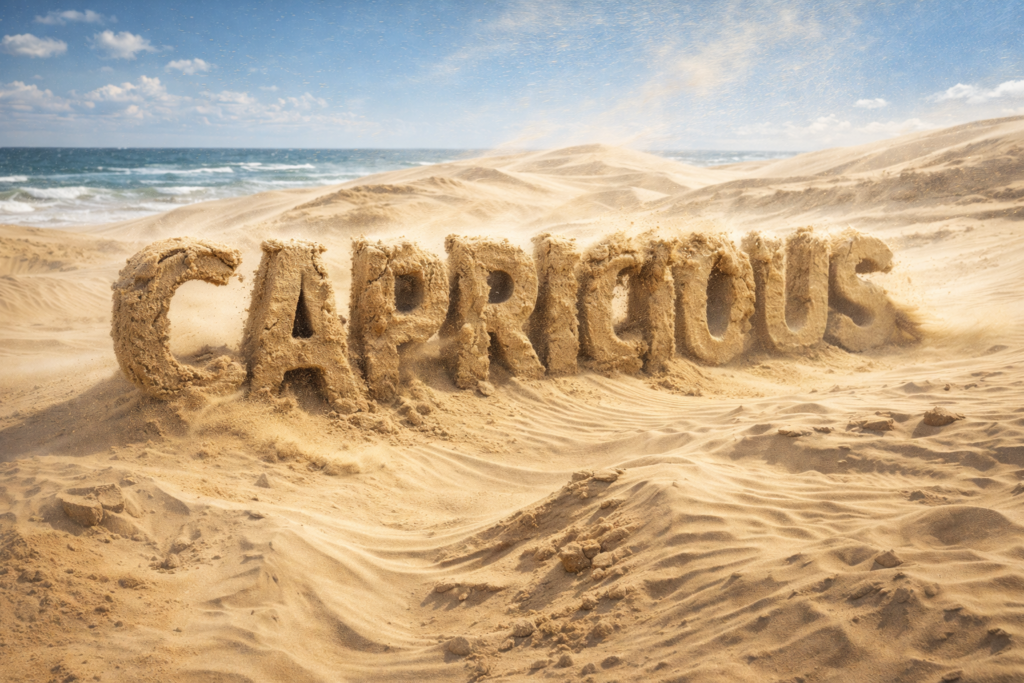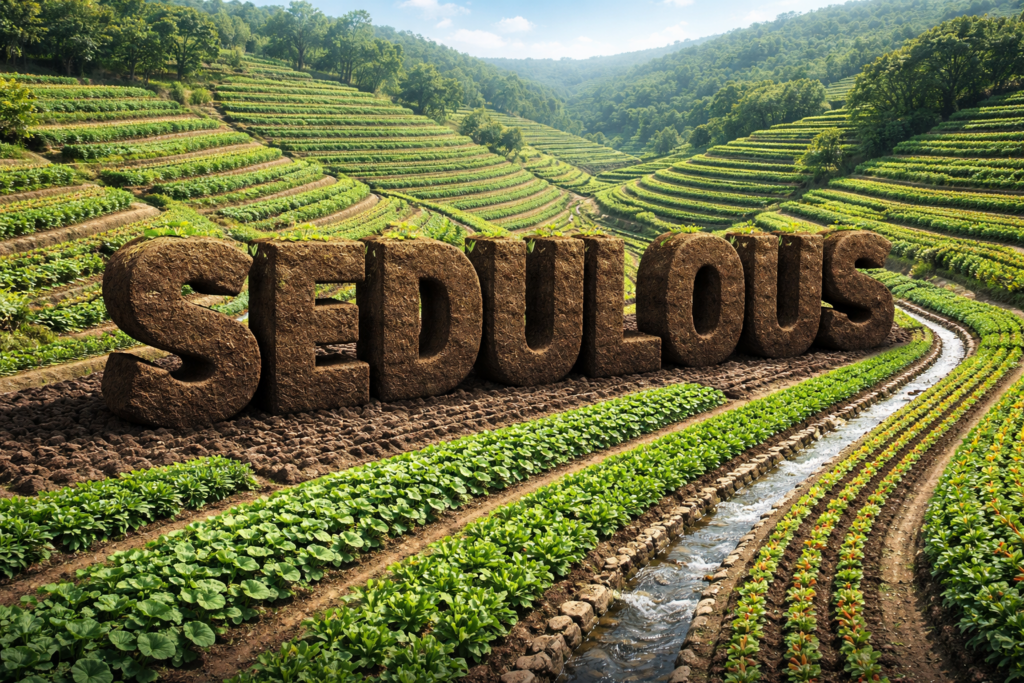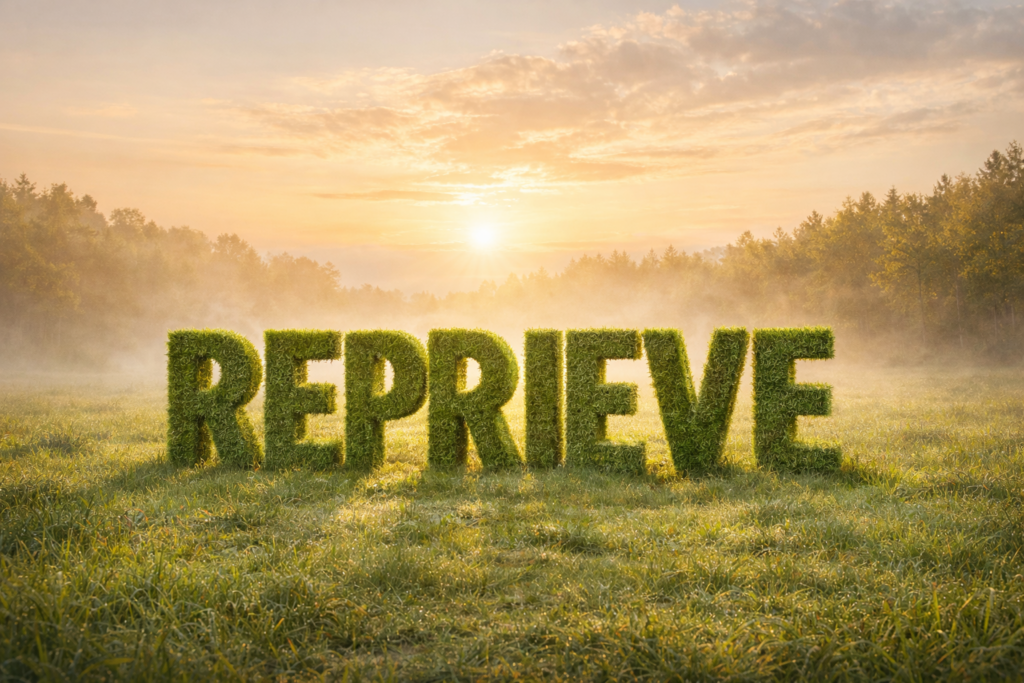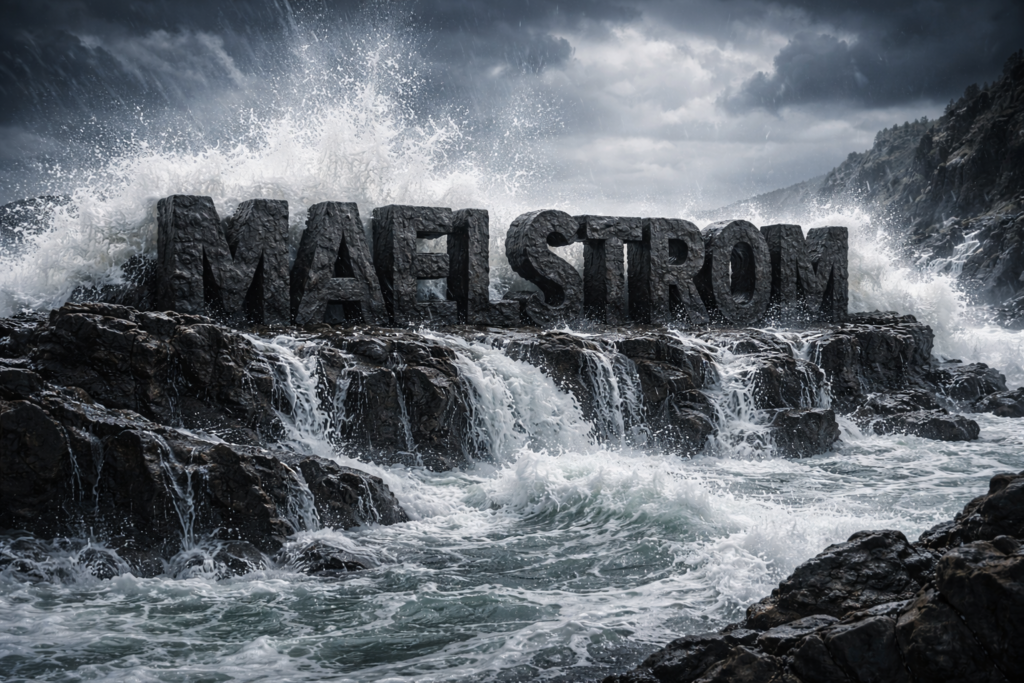Capricious

Today's Word Capricious kuh-PRISH-us Definition (adjective) Given to sudden and unaccountable changes of mood or behavior; unpredictable and impulsive. Example The capricious weather ruined their beach plans when sunny skies suddenly turned to thunderstorms. Word Origin Early 17th century: from French “capricieux,” from Italian “capriccioso,” from “capriccio” meaning “sudden change of mind,” literally “head with hair standing on end” (suggesting fright), from “capo” (head) + “riccio” (hedgehog). Fun Fact Capricious shares its root with “caprice” and originally connected to goats through “Capricorn”—the idea being that goats leap unpredictably from rock to rock, much like capricious behavior jumps from one whim to another. The hedgehog etymology suggests hair standing on end from sudden fright, capturing that startled, impulsive quality. Fashion gets called capricious when trends change inexplicably. Ancient peoples attributed capricious behavior to the gods, whose moods seemed to shift without warning. Unlike “fickle,” which implies shallow changeability, capricious can describe weather, fate, or fortune—impersonal forces that shift without regard to logic. The stock market behaves capriciously, as do certain creative geniuses whose inspiration arrives and departs mysteriously.
Sedulous

Today's Word Sedulous SEJ-uh-lus Definition (adjective) Showing dedication and diligence; persistent and hardworking. Example Her sedulous efforts to master the violin resulted in a flawless performance at the competition. Word Origin Mid-16th century: from Latin “sedulus,” possibly from “sedulo” meaning “zealously,” from “se-” (without) + “dolus” (guile or deception). Fun Fact Sedulous suggests more than simple hard work—it implies careful, persistent attention to detail over time. The Latin root connects to “without guile,” suggesting honest, straightforward effort rather than shortcuts or tricks. Victorian self-help books praised sedulous application as the path to success, contrasting it with flashy talent or lucky breaks. Scientists describe sedulous research that requires years of patient data collection. Unlike “diligent,” which can sound dutiful, sedulous carries a voluntary quality—you’re sedulous because you care about excellence, not just because someone’s watching. The word fell somewhat out of fashion but remains perfect for describing that specific combination of persistence, care, and dedication that produces mastery.
Licentious

Today's Word Licentious ly-SEN-shus Definition (adjective) Promiscuous and unprincipled in sexual matters; disregarding accepted rules or conventions, especially in moral behavior. Example The novel depicted the licentious behavior of aristocrats during the decadent final years of the empire. Word Origin Late Middle English: from Latin “licentiosus,” from “licentia” meaning “freedom or license,” from “licere” meaning “be lawful or permitted.” Fun Fact Licentious comes from the same root as “license,” but where license can be positive freedom, licentious always implies excess beyond acceptable bounds. The word historically condemned sexual promiscuity, but extends to any behavior lacking moral restraint. Ancient Roman moralists worried about licentious living undermining civic virtue. Victorian writers deployed “licentious” to describe everything from revealing clothing to improper thoughts. Modern usage maintains the negative judgment—licentious parties, licentious lifestyles, or licentious disregard for social norms. The word captures that specific combination of sexual impropriety and moral recklessness that simple “promiscuous” doesn’t fully convey. Unlike “libertine,” which can carry romantic connotations, licentious remains firmly condemnatory, suggesting not just freedom from restraint but harmful excess that threatens social order or personal wellbeing.
Idolatrous

Today's Word Idolatrous eye-DAH-luh-trus Definition (adjective) Relating to or practicing idolatry; showing excessive admiration or devotion to someone or something. Example The fans’ idolatrous devotion to the celebrity bordered on unhealthy obsession. Word Origin Late Middle English: from Old French “idolatrer,” from ecclesiastical Latin “idololatria,” from Greek “eidololatria,” from “eidolon” (idol) + “latreia” (worship). Fun Fact Idolatry originally meant worshipping physical objects as gods, violating monotheistic commandments against graven images. Modern usage extends beyond religion—we speak of idolatrous celebrity worship, idolatrous devotion to money or power, or idolatrous nationalism. The biblical prohibition against idolatry shaped Western art history; iconoclastic movements periodically destroyed religious images considered idolatrous. Psychologists discuss how modern consumer culture creates idolatrous relationships with brands and products. The word implies problematic excess—you can admire someone without being idolatrous, but cross a line into worship and admiration becomes unhealthy. Contemporary critique of “toxic fandom” often describes behavior that’s effectively idolatrous, where devotion to entertainers or fictional universes eclipses rational perspective, demonstrating how ancient concepts remain relevant in secular contexts.
Reprieve

Today's Word Reprieve rih-PREEV Definition (noun/verb) A temporary delay or cancellation of punishment; a temporary relief from something difficult or unpleasant. Example The governor granted a last-minute reprieve, postponing the execution pending further review. Word Origin Late 15th century: from Anglo-Norman French “repris,” past participle of “reprendre” meaning “to take back,” from Latin “reprehendere.” Fun Fact Reprieve’s most dramatic usage involves death penalty cases where condemned prisoners receive last-minute postponements—Hollywood loves this scenario, though real reprieves rarely arrive seconds before execution. The word originally meant “to take back,” suggesting punishment withdrawn rather than merely delayed. Unlike pardons, which cancel punishment permanently, reprieves are explicitly temporary—the sword of Damocles remains suspended overhead. Students experience reprieves when deadlines extend, homeowners get reprieves from mortgage payments during hardship, and soldiers might receive temporary reprieve from combat duty. The temporary nature makes reprieves bittersweet—relief mixed with knowledge that the difficult situation will eventually resume. Still, as Benjamin Franklin observed, reprieve is better than no relief at all, offering breathing room to prepare for inevitable challenges.
Maelstrom

Today's Word Maelstrom MAYL-struhm Definition (noun) A powerful whirlpool; or a situation characterized by violent turmoil and confusion. Example The company found itself caught in a maelstrom of negative publicity following the scandal. Word Origin Late 17th century: from early modern Dutch, from “maalen” meaning “to grind or whirl” + “stroom” meaning “stream.” Fun Fact The Maelstrom originally referred to a specific legendary whirlpool off Norway’s coast, said to be so powerful it could sink entire ships. Edgar Allan Poe’s “A Descent into the Maelström” turned the phenomenon into gothic horror, though the real Moskstraumen whirlpool, while impressive, isn’t quite as apocalyptic as legend suggests. The word quickly became metaphorical for any chaotic situation—emotional maelstroms, political maelstroms, or the maelstrom of modern life. Unlike simple chaos, maelstrom suggests circular, self-perpetuating confusion that pulls everything nearby into its vortex. The image of swirling water perfectly captures how chaotic situations build momentum, drawing in bystanders and escalating beyond control. Once you’re in a maelstrom, escape becomes increasingly difficult as centripetal force intensifies.
Balk

Today's Word Balk BAWK Definition (verb/noun) To hesitate or refuse to proceed; to thwart or hinder something. Example The horse balked at the high fence, refusing to jump despite the rider’s encouragement. Word Origin Late Old English: from Old Norse “balkr” meaning “partition” or “beam,” related to the idea of an obstruction. Fun Fact Baseball gave “balk” specialized meaning—when a pitcher makes an illegal motion, runners advance and the pitcher is charged with a balk, one of the sport’s most controversial calls. The original sense of a beam or barrier evolved into describing psychological resistance. Horses balk when something triggers their refusal instinct, making “balk” the perfect word for that specific moment when an animal or person simply won’t proceed despite urging. Politicians balk at proposals they find unacceptable. The phrase “balk at” captures that instant of digging in one’s heels—whether you balk at high prices, unreasonable demands, or scary commitments. Unlike gradual reluctance, balking is the moment of definite refusal, that psychological barrier where forward motion stops regardless of consequences or coaxing.
Quandary

Today's Word Quandary KWON-duh-ree Definition (noun) A state of perplexity or uncertainty, especially regarding what action to take; a difficult situation presenting a dilemma. Example She found herself in a quandary when both job offers presented equally attractive opportunities. Word Origin Late 16th century: perhaps partly from Latin “quando” meaning “when,” though the exact origin remains uncertain. Fun Fact Quandary’s uncertain etymology mirrors the uncertainty it describes—even linguists can’t definitively trace its origin, creating a meta-quandary about the word itself. Unlike “dilemma,” which technically involves exactly two choices, quandary can describe any perplexing situation regardless of option count. The phrase “in a quandary” became popular in 16th-century England, though earlier forms may have existed. Philosophers distinguish between quandaries (practical dilemmas) and aporias (theoretical paradoxes), though both involve intellectual impasses. Quandary suggests genuine difficulty rather than simple indecision—you’re in a quandary when good reasons support multiple incompatible courses. Modern decision theory studies quandaries systematically, but sometimes analysis only deepens the perplexity. The word captures that specific discomfort of facing equally viable options without clear guidance about which to choose.
Truncate

Today's Word Truncate TRUNG-kayt Definition (verb) To shorten something by cutting off the top or end; to reduce in extent or scope. Example The editor had to truncate the article to fit the page limit, removing several concluding paragraphs. Word Origin Late 15th century: from Latin “truncatus,” past participle of “truncare” meaning “to maim or cut off,” from “truncus” meaning “trunk” or “torso.” Fun Fact Truncate shares its origin with “trunk,” both referring to the main body after extremities are removed. Computer scientists truncate data by removing digits (3.14159 truncates to 3.14), distinguishing it from rounding which adjusts the final digit. Architects describe truncated pyramids and cones—shapes with tops sliced off. The geological term “truncated spur” describes mountain ridges cut short by glaciers. Writers sometimes deliberately truncate sentences for dramatic effect, leaving thoughts unfinished to create tension. Unlike “abbreviate,” which can shorten through various methods, truncate specifically means cutting something off, often leaving a sense of incompleteness. The abrupt ending distinguishes truncation from gradual tapering—truncated things end suddenly rather than fading away, creating that distinctly chopped-off feeling.
Adroit

Today's Word Adroit uh-DROYT Definition (adjective) Clever or skillful in using the hands or mind; showing resourcefulness and dexterity. Example Her adroit handling of the difficult conversation prevented the disagreement from escalating. Word Origin Mid-17th century: from French, from the phrase “à droit” meaning “according to right,” from Latin “directus” meaning “direct.” Fun Fact Adroit originally referred to right-handedness (as opposed to “gauche,” meaning left-handed and clumsy), reflecting historical bias favoring right-handed dexterity. The French “à droit” literally means “to the right,” connecting physical skill with correctness. While “dexterous” shares this right-handed etymology, “adroit” emphasizes mental agility alongside physical skill. Politicians practice adroit maneuvering through complex situations, social climbers demonstrate adroit networking, and diplomats deploy adroit language to navigate sensitive topics. The opposite “maladroit” means clumsy or inept, though it’s far less commonly used—we’re quicker to praise skill than label awkwardness. Someone adroit makes difficult tasks look effortless, whether juggling, negotiating, or managing interpersonal dynamics, demonstrating the grace that comes from combining intelligence with capability.
